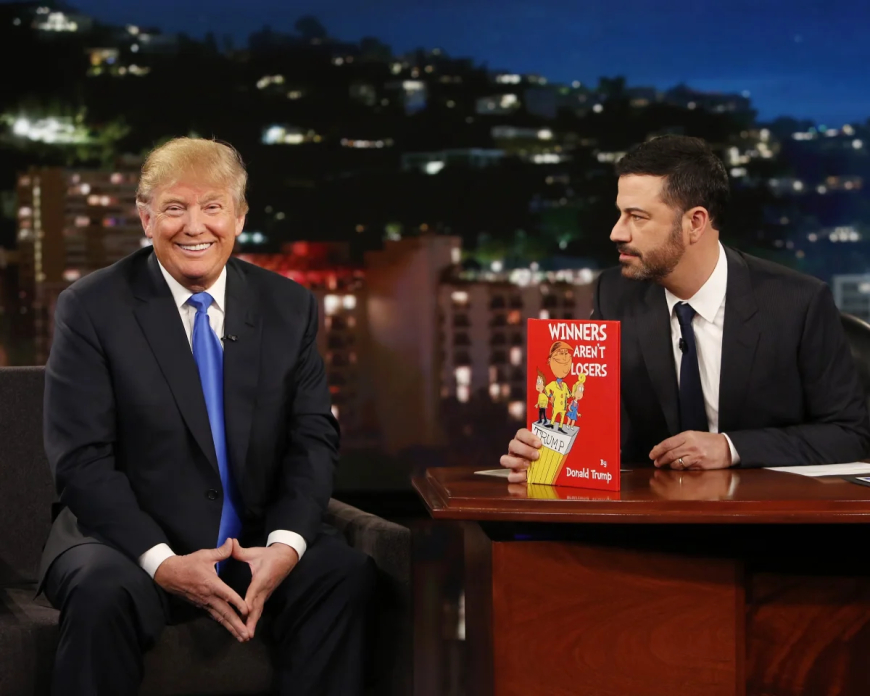Jimmy Kimmel Suspension: Why Donald Trump is Obsessed with US Late-Night TV and Comedy
The suspension of Jimmy Kimmel highlights the intense political and corporate pressure on US late-night TV. Discover why Donald Trump views hosts like Kimmel as an "arm of the Democratic party," breaking a long tradition of political satire.

By: Daninik Realty Bureau | Date: | 21 Sep 2025
The Crisis Facing US Late-Night Comedy
The Unprecedented Pressure on Political Satire
US late-night television has long featured hosts "riffing on the political news of the day" since the format was launched by NBC in the mid-1950s. However, this uniquely American relationship—where presidents from JFK to Bill Clinton accepted the "relentless punchlines as part of the job"—is now facing intense political opposition, primarily from former President Donald Trump. The severity of the situation recently escalated when ABC made the decision to indefinitely suspend comedian Jimmy Kimmel from his late-night talk show following "on-air remarks about the killing of Charlie Kirk". Following this action, Donald Trump encouraged further action against other late-night hosts.
Historically, topical humor started mildly with Steve Allen, the radio host who launched what became The Tonight Show, who regularly poked fun at political figures using a measured, self-deprecating style. The shift occurred in 1962 when Johnny Carson took over The Tonight Show, transforming it into a "cultural institution where politics was mined for nightly material". Carson, often called "the king of late-night," used satire and impersonations to highlight "the human inconsistencies within politics". At its peak, The Tonight Show attracted 17 million nightly viewers, leading Americans to perceive Carson as offering a "clearer lens on current events than straight news". Research confirms his influence: a 2022 article found that Carson’s daily mentions of Richard Nixon or Watergate in the early 1970s were a "major contributor to the president’s approval rating crash".
When Politicians Embraced Late-Night TV
The tradition of political figures engaging with late-night comedy began cautiously. While the presidential office was once considered "above late-night larking," both Nixon’s and John F Kennedy’s separate Tonight Show appearances as presidential candidates in the 1960s broke new ground. The subsequent "clubby relationship" between Carson and Ronald Reagan (then governor of California) firmly established late-night TV as "an extension of the political arena". By the 1990s, when Carson was retiring, presidential hopefuls began actively seeking late-night appearances as a strategy to connect with younger voters seeking a "more relatable stripe of politician".
Key examples of this political-comedic symbiosis include:
- Bill Clinton's inaugural campaign being invigorated by his appearance on The Arsenio Hall Show in 1992, where he played the saxophone for "Heartbreak Hotel," securing enduring support from Black voters.
- In 2000, candidate George W Bush appeared on the Late Show with David Letterman to read the trademark Top 10 list.
- In 2009, Barack Obama became the first sitting US president to appear on late-night TV, joining Jay Leno on The Tonight Show to promote his economic recovery plan.
Despite the rise of "more pointed and partisan political skepticism" from shows like The Daily Show and Politically Incorrect with Bill Maher during the Clinton era, presidents generally "accepted the relentless punchlines as part of the job".
Trump’s Pivot from Guest to 'Acid-Tongued Critic'
Donald Trump is described as a "different political animal". Unlike his predecessors who became monologue material after launching their campaigns, Trump’s pre-Oval Office persona was already shaped by late-night comedians riffing off his "exhaustively documented divorces, business failings and rebound in reality TV".
His turning point from a guest to an intense critic began after his 2016 appearance on The Tonight Show Starring Jimmy Fallon. Trump was the "singular presidential hopeful" who had already hosted SNL twice. When Fallon notoriously "mussed Trump’s hair," media observers suggested this gesture "humanized Trump and his polarizing brand of politics," which Fallon later expressed regret for. Trump responded by calling out Fallon’s manhood.
Trump has been "especially harsh on Kimmel," who has consistently kept the MAGA movement, its "corrosive policies and polarizing rhetoric in crosshairs". This conflict intensified after candidate Trump backed out of a scheduled 2015 appearance at the last minute. Reports indicate that the first Trump administration put pressure on ABC and parent company Disney to rein in Kimmel. However, this request was met with "tougher jokes" when Kimmel hosted the Oscars. Trump subsequently turned to social media to air his grievances, often calling on TV to "bring back Johnny," despite Carson having been dead for 20 years and having cautioned against entertainers using politics to alienate audiences.
Corporate Threats and the Fight for Free Speech
Late-night comedy is now battling not only political attacks but also pressure from "politically obsequious corporate masters". Trump, speaking from Air Force One, threatened "anyone with an FCC broadcast license who spends too much time criticizing him," declaring: "They are an arm of the Democratic party" and that "all they do is hit Trump".
This political pressure coincides with significant corporate moves:
- In July, CBS abruptly canceled The Late Show with Stephen Colbert, an "unrelenting Trump critic". While CBS and Paramount chiefs claimed it was "purely a financial decision," the move was largely interpreted as a major corporate effort to "circumvent monopoly law" to facilitate Paramount’s billion-dollar sale to Skydance Media, and was "decried as a crackdown on free speech".
- Nexstar Media, a "conservative-leaning TV station conglomerate" with numerous ABC affiliates, is actively "pushing the Trump administration to clear a path for its own potential monopoly through a merger with rival Tegna".
With fractured audiences deeply eroding profit margins, late-night shows now risk "losing more than just audience share" by mocking the administration. Ironically, Disney’s decision to suspend Kimmel sent the company’s stock price tumbling amid protests and lost subscribers.
Conclusion
In the current polyculture where truth is no longer absolute and US journalism institutions are being discredited by Trump and his allies, late-night comedy is "fighting to remain a bellwether of truth". In response to the growing authoritarian climate, Kimmel’s surviving peers—including Fallon and Jon Stewart—kicked off their shows with satirical set pieces that "bowed to the president and paid mock respect to him as an authoritarian". Similarly, Colbert "dusted off his rightwing blowhard character to get in a few subliminal digs at Trump". This "jokecraft speaks to the seriousness of the times," confirming late-night’s determination to "carry on serving as the country’s political lens – regardless of the ultimate cost".
FAQs (5 Q&A)
Q1. Why was Jimmy Kimmel recently suspended from his talk show? A: Jimmy Kimmel was indefinitely suspended from his late-night talk show by ABC following "on-air remarks about the killing of Charlie Kirk". Following this suspension, Donald Trump "encouraged further action against other late-night hosts".
Q2. Why is Donald Trump so critical of hosts like Jimmy Kimmel? A: Trump has been "especially harsh on Kimmel," who keeps the MAGA movement and its rhetoric in crosshairs. Trump claims these hosts are "an arm of the Democratic party" and threatened action against anyone with an FCC license who criticizes him too much.
Q3. How did Johnny Carson influence political satire in late-night TV? A: Carson, who took over The Tonight Show in 1962, transformed it into a cultural institution, attracting 17 million viewers at its peak. His daily mentions of figures like Nixon contributed significantly to the president’s approval rating crash, demonstrating his influence on the culture.
Q4. What was the significance of the 2016 hair-mussing incident with Jimmy Fallon? A: When Fallon mussed Trump's hair on The Tonight Show in 2016, media observers argued it "humanized Trump". Fallon later expressed regret for "normalizing" Trump, to which Trump responded by "calling out Fallon’s manhood".
Q5. Was the cancellation of Stephen Colbert’s show a financial or political decision? A: CBS and Paramount claimed the abrupt cancellation of The Late Show with Stephen Colbert was "purely a financial decision". However, the move was widely viewed as a "larger corporate effort to circumvent monopoly law" and was "decried as a crackdown on free speech".







































